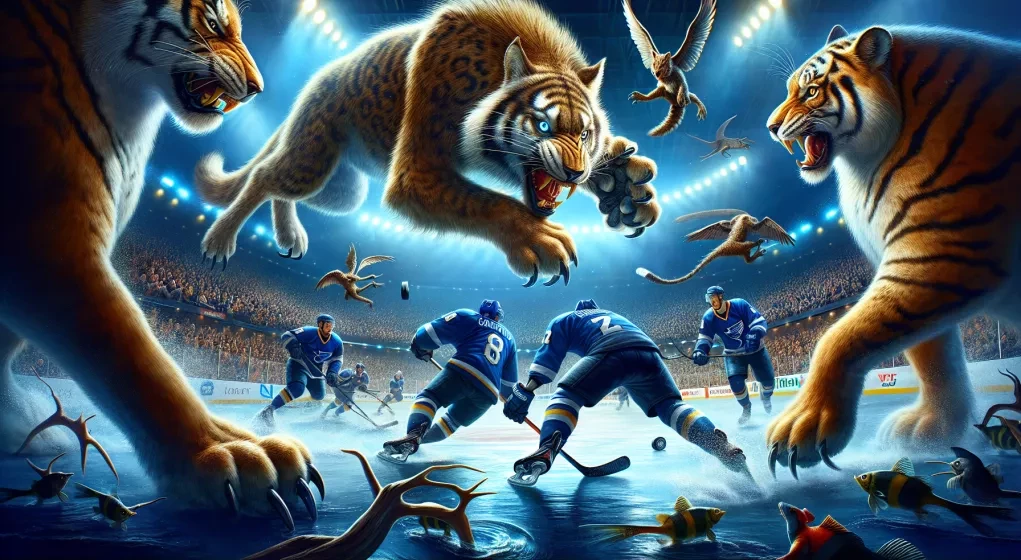In a night where the bizarre became the norm and the expected turned on its head, the Minnesota Wild and the Vancouver Canucks scripted one of the most astonishing contests of the hockey season. A total of three hat tricks adorned this absurd drama that unfolded on ice—a spectacle so surreal, it defied any notion of regularity in the National Hockey League, a league where the unexpected is often the only expectation.
Though the Canucks were perched proudly atop the league standings, the Wild untamed and unleashed a stunning offensive torrent in the game’s dying embers, rattling in eight goals in a mere twenty minutes. An ostensible 5-2 advantage for Vancouver metamorphosed into a staggering 10-7 defeat, marking their first somber trudge away in regulation this season when leading into the final period.
The scoreline harkened back to the free-wheeling ’80s, a period when goalies bore more resemblance to padded newsboys than the armored guardians of today’s nets. The three netminders—two Wild and a lone Canuck—left their creases with a combined save percentage of just .694. And as if mimicking the coordinated orchestration of a grand symphony, three players—two hosts and one guest—struck the chord for hat tricks.
Yet the game’s intrigue stretched beyond the sheer volume of goals or the star turns of individual performances. The manner of their arrival—four powerplays, pucks ricocheting off skates, and empty-netters including one that came as the final horn loomed—all added to the game’s rich tapestry.
Canucks fans likely seethed at the abundance of Wild’s two-man advantages—a rarity in the sport made more acute by the frequency of their occurrence that night. Cries of officiating bias filled the air, spurned by the echoes of Tyler Myers’ postgame grievances from a previous dispute with the Jets—a battle against “two teams,” as he had proclaimed.
Yet, the cold evaluation lies not in the controversy of calls but in the indiscretions of the Canucks. It was their discipline—or lack thereof—that served as an accomplice to their downfall, from a dubious roughing call on Elias Lindholm to the series of penalties that were rightfully earned.
Late-game comments from coach Rick Tocchet cut through the noise, chalking up the penalties to foolish mistakes and underlining the necessity of composure. “You’ve got to learn how to play under pressure,” he said, a lesson hard learned with the playoffs lurking ominously on the horizon.
Despite the pandemonium, moments of elegance shone. Pettersson’s goal, born from dominating shifts and sublime teamwork, was too pristine for such a chaotic clash. Miller’s hat trick, completed with a solo show of skill and sheer force of will, was another high in a game of fluctuating fortunes.
The third period, where the fabric of the game unraveled completely, was as enigmatic as it was electric. Wild’s onslaught, initiated just 28 seconds after the resumption, exploited every opportunity handed to them. Eriksson Ek’s hat trick strike, the deflection from Rossi’s skate, each a stitch in the tapestry of triumph for the Wild and a dagger deeper into the aspirations of the Canucks.
Yet Vancouver’s resilience shone through, as Boeser trimmed the deficit to one with time ticking away. But it was not to be—two final empty-netters from the Wild sealed the Canucks’ fate on this night of nights.
Despite the game’s peculiarities, J.T. Miller’s reflections postgame struck a chord of normalcy amidst the noise. “Such a weird game and games don’t happen like this very often,” he said, choosing to focus on the positives amidst the erratic ebb and flow. And it’s true, the Canucks, particularly when enacting their strategy at 5-on-5, were not undeserving of a better fate.
As the dust settles on this wild encounter, attention swiftly moves to the looming encounter with the Avalanche. The match promises not just an ordinary rebound but a litmus test for the character and resolve of a Canucks team determined to avoid a third consecutive defeat and to glean lessons from a night that rewrote the boundaries of possibility in hockey.






